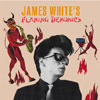JAMES WHITE, "JAMES WHITE'S FLAMING DEMONICS"
Ze
 1983's Flaming Demonicscomes right at the end of James White's four-year run as the reigningKing Shit of No-Wave Fuck Mountain, and the intervening years have notbeen as kind to this album as they have been to his earlier efforts. Bythis time, White had parted company with The Contortions/Blacks, andthey are sorely missed. For Flaming Demonics, White insteadutilizes an assemblage of studio session players, who, while certainlytalented, are more orthodox in their approach, bringing much of themusic the too-polished veneer of traditional jazz playing. Coming afterthe similarly lackluster Sax Maniac, this album probablysounded a death knell for the artist, evidenced by the fact that hestopped performing and recording not long after its release. Inhindsight, however, the album is not nearly as bad as some haveclaimed, and it contains several tracks that James White converts willfind especially entertaining. The album continues White'sMephistophelian obsession with the diabolism of jazz and funk music,with plenty of lyrical allusions to the selling of his soul and thedemonic possession supposedly evidenced by his serpentine horn blasts.The album opens with "The Devil Made Me Do It," where unnaturalpolyrhythms form an uncomfortable backdrop for staccato swipes ofjangling funk guitar and an abrasively lyrical saxophone dialogue."Rantin' and Ravin'" is an extended rock-bop instrumental, soundingsurprisingly similar to James Brown's early-80's work ("Livin' InAmerica," anyone?). Your reaction to that comparison will no doubtlargely determine your opinion of this material. Things get a littlebetter with a medley of Duke Ellington classics ("Caravan" and "ItDon't Mean A Thing"), which are unceremoniously thrown into the mixwith the White original "Melt Yourself Down.". The whole mess providesnine minutes of ararchic fun, especially the incongruously chaoticelectric organ solo towards the beginning. This reissue includes threebonus tracks, which travel even further down the homogenized, early80's rock-jazz path, veering dangerously close to Huey Lewis and theNews territory. A version of one of my favorite early-60's rock n' rollsongs, Gene Pitney's "Town Without Pity," is a little tooself-consciously "cute" for White, and his head-scratching version leftme wondering about his motives in covering such a classic song. Allgood things must come to an end, alas.
1983's Flaming Demonicscomes right at the end of James White's four-year run as the reigningKing Shit of No-Wave Fuck Mountain, and the intervening years have notbeen as kind to this album as they have been to his earlier efforts. Bythis time, White had parted company with The Contortions/Blacks, andthey are sorely missed. For Flaming Demonics, White insteadutilizes an assemblage of studio session players, who, while certainlytalented, are more orthodox in their approach, bringing much of themusic the too-polished veneer of traditional jazz playing. Coming afterthe similarly lackluster Sax Maniac, this album probablysounded a death knell for the artist, evidenced by the fact that hestopped performing and recording not long after its release. Inhindsight, however, the album is not nearly as bad as some haveclaimed, and it contains several tracks that James White converts willfind especially entertaining. The album continues White'sMephistophelian obsession with the diabolism of jazz and funk music,with plenty of lyrical allusions to the selling of his soul and thedemonic possession supposedly evidenced by his serpentine horn blasts.The album opens with "The Devil Made Me Do It," where unnaturalpolyrhythms form an uncomfortable backdrop for staccato swipes ofjangling funk guitar and an abrasively lyrical saxophone dialogue."Rantin' and Ravin'" is an extended rock-bop instrumental, soundingsurprisingly similar to James Brown's early-80's work ("Livin' InAmerica," anyone?). Your reaction to that comparison will no doubtlargely determine your opinion of this material. Things get a littlebetter with a medley of Duke Ellington classics ("Caravan" and "ItDon't Mean A Thing"), which are unceremoniously thrown into the mixwith the White original "Melt Yourself Down.". The whole mess providesnine minutes of ararchic fun, especially the incongruously chaoticelectric organ solo towards the beginning. This reissue includes threebonus tracks, which travel even further down the homogenized, early80's rock-jazz path, veering dangerously close to Huey Lewis and theNews territory. A version of one of my favorite early-60's rock n' rollsongs, Gene Pitney's "Town Without Pity," is a little tooself-consciously "cute" for White, and his head-scratching version leftme wondering about his motives in covering such a classic song. Allgood things must come to an end, alas.
 1983's Flaming Demonicscomes right at the end of James White's four-year run as the reigningKing Shit of No-Wave Fuck Mountain, and the intervening years have notbeen as kind to this album as they have been to his earlier efforts. Bythis time, White had parted company with The Contortions/Blacks, andthey are sorely missed. For Flaming Demonics, White insteadutilizes an assemblage of studio session players, who, while certainlytalented, are more orthodox in their approach, bringing much of themusic the too-polished veneer of traditional jazz playing. Coming afterthe similarly lackluster Sax Maniac, this album probablysounded a death knell for the artist, evidenced by the fact that hestopped performing and recording not long after its release. Inhindsight, however, the album is not nearly as bad as some haveclaimed, and it contains several tracks that James White converts willfind especially entertaining. The album continues White'sMephistophelian obsession with the diabolism of jazz and funk music,with plenty of lyrical allusions to the selling of his soul and thedemonic possession supposedly evidenced by his serpentine horn blasts.The album opens with "The Devil Made Me Do It," where unnaturalpolyrhythms form an uncomfortable backdrop for staccato swipes ofjangling funk guitar and an abrasively lyrical saxophone dialogue."Rantin' and Ravin'" is an extended rock-bop instrumental, soundingsurprisingly similar to James Brown's early-80's work ("Livin' InAmerica," anyone?). Your reaction to that comparison will no doubtlargely determine your opinion of this material. Things get a littlebetter with a medley of Duke Ellington classics ("Caravan" and "ItDon't Mean A Thing"), which are unceremoniously thrown into the mixwith the White original "Melt Yourself Down.". The whole mess providesnine minutes of ararchic fun, especially the incongruously chaoticelectric organ solo towards the beginning. This reissue includes threebonus tracks, which travel even further down the homogenized, early80's rock-jazz path, veering dangerously close to Huey Lewis and theNews territory. A version of one of my favorite early-60's rock n' rollsongs, Gene Pitney's "Town Without Pity," is a little tooself-consciously "cute" for White, and his head-scratching version leftme wondering about his motives in covering such a classic song. Allgood things must come to an end, alas.
1983's Flaming Demonicscomes right at the end of James White's four-year run as the reigningKing Shit of No-Wave Fuck Mountain, and the intervening years have notbeen as kind to this album as they have been to his earlier efforts. Bythis time, White had parted company with The Contortions/Blacks, andthey are sorely missed. For Flaming Demonics, White insteadutilizes an assemblage of studio session players, who, while certainlytalented, are more orthodox in their approach, bringing much of themusic the too-polished veneer of traditional jazz playing. Coming afterthe similarly lackluster Sax Maniac, this album probablysounded a death knell for the artist, evidenced by the fact that hestopped performing and recording not long after its release. Inhindsight, however, the album is not nearly as bad as some haveclaimed, and it contains several tracks that James White converts willfind especially entertaining. The album continues White'sMephistophelian obsession with the diabolism of jazz and funk music,with plenty of lyrical allusions to the selling of his soul and thedemonic possession supposedly evidenced by his serpentine horn blasts.The album opens with "The Devil Made Me Do It," where unnaturalpolyrhythms form an uncomfortable backdrop for staccato swipes ofjangling funk guitar and an abrasively lyrical saxophone dialogue."Rantin' and Ravin'" is an extended rock-bop instrumental, soundingsurprisingly similar to James Brown's early-80's work ("Livin' InAmerica," anyone?). Your reaction to that comparison will no doubtlargely determine your opinion of this material. Things get a littlebetter with a medley of Duke Ellington classics ("Caravan" and "ItDon't Mean A Thing"), which are unceremoniously thrown into the mixwith the White original "Melt Yourself Down.". The whole mess providesnine minutes of ararchic fun, especially the incongruously chaoticelectric organ solo towards the beginning. This reissue includes threebonus tracks, which travel even further down the homogenized, early80's rock-jazz path, veering dangerously close to Huey Lewis and theNews territory. A version of one of my favorite early-60's rock n' rollsongs, Gene Pitney's "Town Without Pity," is a little tooself-consciously "cute" for White, and his head-scratching version leftme wondering about his motives in covering such a classic song. Allgood things must come to an end, alas.



